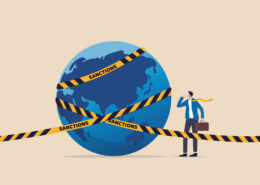Targeting Russia’s IT Dependencies
OFAC Issues New Determination on IT
📅 July 16, 2024
📅 July 16, 2024
Computers and Information Technology (IT) are ubiquitous. Nations, organizations, infrastructure, economic sectors, schools, and homes use computers for everything from architecture and research to weapons systems design. Russia is particularly dependent on western software for manufacture of military materiel as well as energy extraction—the backbone of Moscow’s ability to fund its war in Ukraine, and the U.S. Treasury’s Office of Foreign Assets Control (OFAC) has recently taken critical steps to hinder Russia’s ability to use U.S. IT and software services.
A new determination issued by OFAC pursuant to Executive Order (EO 14071)—Prohibiting New Investment in and Certain Services to the Russian Federation in Response to Continued Russian Federation Aggression—applies prohibitions on the exportation, re-exportation, sale, or supply, directly or indirectly, from the United States or U.S. persons to any person in Russia of IT consultancy and design services and IT support services and cloud-based services for enterprise management software and design and manufacturing software.
⏰ The effective date for OFAC’s prohibition on IT consultancy, design service, and support for certain IT services is September 12, 2024, giving U.S. persons three months to implement changes.
Computer data centers and cloud file storage services contribute to the resilience of Russia’s economy and support Moscow’s ability to wage war in Ukraine, according to a recent report from the Yermak-McFaul International Working Group on Russian Sanctions at Stanford University’s Freeman Spogli Institute for International Studies. The Russian energy sector relies on modeling software and cloud services, using AI and big data to enhance efficiency and reservoir engineering and modeling software for the design, management, and exploitation of oil and gas deposits, according to the report. Western software dominates the Russian energy industry, and Russia continues to access and use these advanced software systems.
Although Russian laws mandate that cloud providers store data only in Russia, the working group paper highlights that “key virtualization software, network equipment, and related infrastructure are designed and developed by western companies.”
The Institute for Financial Integrity’s article in February focused on exhausting Russian resources by imposing restrictions to limit Russia’s access to western software, underscoring ongoing global efforts to hinder Russia’s ability to use western technologies.
OFAC’s recent determination does just that.
What are “cloud-based services” for “covered software,”—currently defined as “enterprise management software” and “design and manufacturing software?”
OFAC’s new Frequently Asked Question (FAQ) 1186 defines cloud-based services as the supply of software and associated services via the internet or the cloud, including through Software-as-a-Service (SaaS).
OFAC also provides examples of activities that would be prohibited by the new determination if provided to Russian entities not owned or controlled directly or indirectly by a U.S. person.
The new determination complements new regulations by the U.S. Commerce Department’s Bureau of Industry and Security (BIS), which issued additional measures in its continued efforts to constrain Russia’s aggression in Ukraine.
OFAC also clarified that “IT consultancy and design services,” include both IT consultancy services and IT design and development services for applications, consistent with the UN Central Production Classification (“CPC”) Codes 83131 and 83141, respectively. In a new FAQ (1187), the agency noted that:
The Yermak-McFaul working group paper highlights the reliance of Russian IT systems on western technologies, which provide support not just for Russia’s military, but also the energy and extractive and financial sectors. Russia is almost certainly aware of how vulnerable critical sectors of its economy are to western disruption and is already focusing on mandating Russian alternatives, diverting resources from the battlefield in Ukraine.
OFAC notes in its FAQ (1184) that the aim of the new directive is not to prohibit all activity relating to the provision of IT and software-related services to Russia, but rather to limit Russian defense industry’s access to western IT systems and the flow of certain software-related services to Russia. However, OFAC recently assessed that Russia has completed its transition to a full wartime economy, suggesting that IT services are targeted as part of the support system Russia’s military requires to conduct its aggression in Ukraine.
BIS took additional actions in coordination with OFAC’s determination and new designations in mid-June, further cutting off exports of business software that help enable Russian and Belarussian military capabilities. The new restrictions include the export, reexport, or transfer (in country) of certain types of software to Russia and Belarus, even when not specifically identified on the Commerce Control List, with the goal of hindering Russia’s and Belarus’s military industrial sector’s access to modern software infrastructure.
BIS now requires a license to export, re-export, or transfer to Russia or Belarus of EAR99 software (classification of technologies that fall within the scope of the Export Administration Regulations but are not specifically controlled for export). This includes enterprise resource planning (ERP), customer relationship management (CRM), business intelligence, supply chain management, project management, computer-aided design, and other types of software.
EAR99 items can generally be exported without a license, but exporters of these items still need to ensure that the item is not going to an embargoed or sanctioned country, a prohibited end-user, or used for prohibited purposes.
The new regulations appear to mirror at least some of the recommendations listed in the Yermak-McFaul group’s working paper—including efforts to ensure that western companies stop providing updates and technical support for software used by Russian entities linked to the country’s military-industrial base—and echo those implemented by the EU and the UK after Russia’s invasion.
In response to EU sanctions prohibiting services necessary for software updates, global IT giant Microsoft in March stopped its cloud services from working in Russia. Russian IT firm Softline also has advised Russian users of Microsoft, Google, and Amazon services to store their data on local servers in response to the restrictions.
OFAC provides several examples of prohibited activities under the new determination. A U.S. company, for example, cannot sign a contract with a Russian company to upgrade the Russian firm’s IT systems. A U.S. consulting company cannot advise a Russian company how to best procure the types of software and hardware needed for its operations. U.S. companies cannot design or create custom-made software for the Russian company and cannot modify existing web applications for the Russian company’s internal IT purposes. And a U.S. person working in a third country cannot sign a contract with a Russian company to design the company’s sales website.
Multinational companies that provide IT services, software, consulting, and other related work to clients located in Russia should closely evaluate their exposure to continuously expanding sanctions and strategic trade controls before the September 12 deadline. Resources such as IP blocking and geolocation tools, as well as closer evaluation of indicators of diversion or evasion will be necessary to remain in compliance.

U.S. prohibitions on IT services to Russia complicate an already challenging sanctions environment. Stay informed and current on the latest prohibitions and restrictions, gain insights from experts, and track the latest developments in the global Russia sanctions regime on DOLFIN.










 Three Lines of Defense: Case Study
Three Lines of Defense: Case StudyThis site uses cookies. By continuing to browse the site, you are agreeing to our use of cookies.
Accept settingsHide notification onlySettingsWe may request cookies to be set on your device. We use cookies to let us know when you visit our websites, how you interact with us, to enrich your user experience, and to customize your relationship with our website.
Click on the different category headings to find out more. You can also change some of your preferences. Note that blocking some types of cookies may impact your experience on our websites and the services we are able to offer.
These cookies are strictly necessary to provide you with services available through our website and to use some of its features.
Because these cookies are strictly necessary to deliver the website, refusing them will have impact how our site functions. You always can block or delete cookies by changing your browser settings and force blocking all cookies on this website. But this will always prompt you to accept/refuse cookies when revisiting our site.
We fully respect if you want to refuse cookies but to avoid asking you again and again kindly allow us to store a cookie for that. You are free to opt out any time or opt in for other cookies to get a better experience. If you refuse cookies we will remove all set cookies in our domain.
We provide you with a list of stored cookies on your computer in our domain so you can check what we stored. Due to security reasons we are not able to show or modify cookies from other domains. You can check these in your browser security settings.
These cookies collect information that is used either in aggregate form to help us understand how our website is being used or how effective our marketing campaigns are, or to help us customize our website and application for you in order to enhance your experience.
If you do not want that we track your visit to our site you can disable tracking in your browser here:
We also use different external services like Google Webfonts, Google Maps, and external Video providers. Since these providers may collect personal data like your IP address we allow you to block them here. Please be aware that this might heavily reduce the functionality and appearance of our site. Changes will take effect once you reload the page.
Google Webfont Settings:
Google Map Settings:
Google reCaptcha Settings:
Vimeo and Youtube video embeds:
You can read about our cookies and privacy settings in detail on our Privacy Policy Page.
Privacy Policy